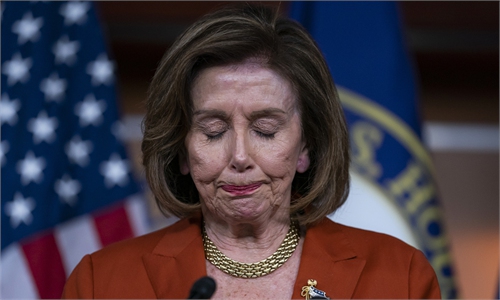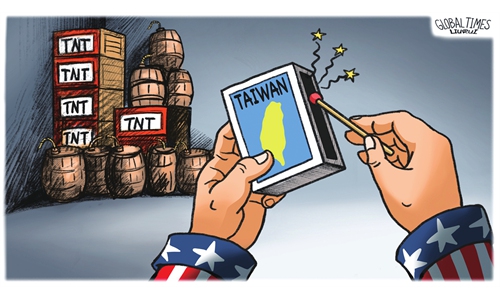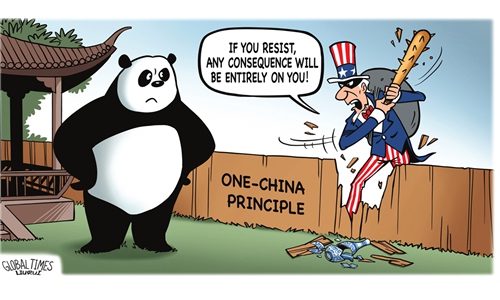US' 'ambitious' roadmap for trade deals a nightmare for Taiwan island: expert
Scheme risks decoupling from the mainland

Illustration: Liu Rui/GT
The US is mulling an "ambitious" roadmap for trade negotiations with the island of Taiwan and would announce it in the coming days, the Biden administration's Asian affairs advisor said Friday as he claimed China "overreacted" to US House of Representatives Speaker Nancy Pelosi's provocative visit to Taiwan.
Analysts said on Saturday US' scheme aims to use the island as a chess piece to contain China, while the secessionist Democratic Progressive Party (DPP) authorities will obtain no political or economic benefit.
The DPP authorities' collusion with the US at the cost of the vital interests of Taiwan and the people within the island for its own political benefits will risk decoupling the island from the mainland and accordingly result in economic contraction, they said.
"We'll continue, consistent with our One China policy, to deepen our ties with Taiwan, including through continuing to advance our economic and trade relationship," Kurt Campbell, Deputy Assistant to the President and Coordinator for the Indo-Pacific, said at a press call on Friday (US time), according to a transcript on the White House website.
Campbell said the US and Taiwan region are developing an "ambitious" roadmap for trade negotiations, which will be announced in the coming days.
The so-called roadmap is a follow-up of the so-called the US-Taiwan Initiative on 21st-Century Trade launched on June 1, which the US claimed, is intended to develop concrete ways to deepen the economic and trade relationship, and reach agreements in sectors including trade facilitation, regulatory practices, agriculture and state-owned enterprises.
Zhang Wensheng, deputy dean of the Taiwan Research Institute at Xiamen University, told the Global Times that the US does not want a real trade deal with the Taiwan region, instead the US wants to take advantage of the island in its containment of China.
US politicians do not care about the well-being of the Taiwan people at all, and what they care about is controlling Taiwan's semiconductor industry and using the island to suppress China, Zhang said, noting that in the eyes of US, the island and its people are only chess piece and tools to be manipulated.
In exchange for the US' support for its secessionist acts, the DPP authorities have constantly sold out the island's interests. The DPP has been silent on specific issues concerning the vital interests of the people within the island, such as imports of US pork containing widely banned feed additive ractopamine and Taiwan chipmaker TSMC's handover of data to the US government.
"If the secessionist Tsai Ing-wen administration continues to act arbitrarily, they will send the Taiwan economy into recession, and will eventually be thrown out," said Dai Shugeng, a professor of economics at Xiamen University.
In sign of Taiwan's heavy reliance on the mainland market, the island of Taiwan saw trade deficits with major economies such as the US and South Korea while its trade surplus with the mainland has been huge at around $170 billion each year, he said.
"The mainland is the largest market for Taiwan agricultural products and accounts for over 60 percent of Taiwan's semiconductor and computer equipment exports," he said, noting that the mainland's contribution to the region's GDP is 21.72 percent.
Despite the protracted impact of COVID-19 and an intense relationship, the mainland's imports from the Taiwan region reached $142 billion between January and July, an increase of 5.2 percent on a yearly basis, data from the General Administration of Customs (GAC) showed.
The mainland recently banned certain fruit and seafood imports from the island to punish the DPP authorities which had courted US House Speaker Nancy Pelosi and triggered political instability in the Taiwan Straits.
Experts said the ban proves that the DPP authorities' unwise move of getting closer with the US goes against the facts of the region's economy and trade as well as the benefits of the Taiwan people, whereas any potential trade agreement would be a nightmare for the DPP.
China has always opposed any form of official exchange between any country and Taiwan, including the signing of any economic and trade agreements with sovereign connotations and official nature, Gao Feng, a spokesperson of the Ministry of Commerce, said at a press briefing on June 2.
The US should follow the one-China principle and the three China-US joint communiques, abide by international law and the basic norms of international relations, prudently handle its economic and trade relations with Taiwan region and avoid sending wrong signals to "Taiwan independence" secessionist forces, he said.
"The DPP authorities need to give up on the idea that they could seek independence with US support, otherwise the higher they jump, the harder they will fall," Chinese Foreign Ministry spokesperson Zhao Lijian stressed at a regular press briefing on June 28.




